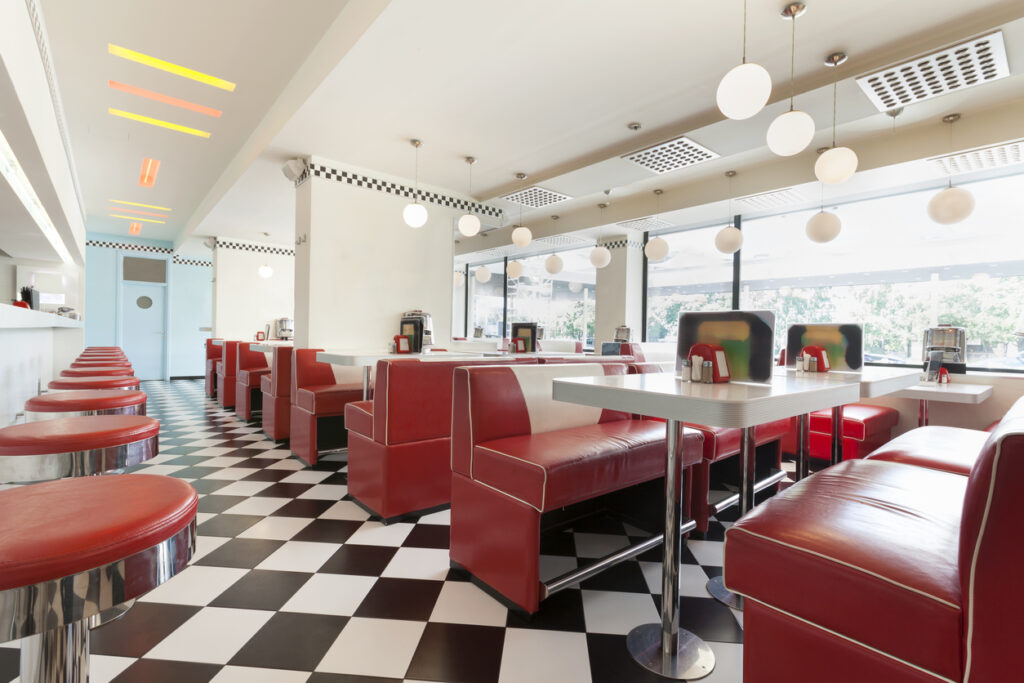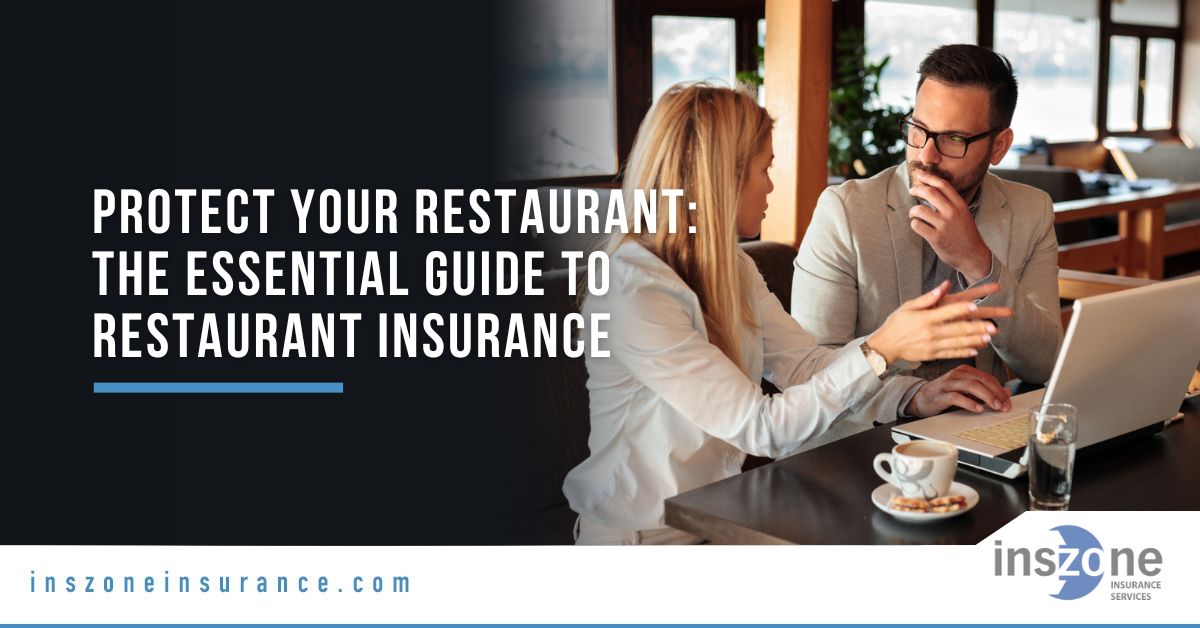Restaurant insurance is a custom bundle of commercial coverages (property, liability, auto, workers’ comp, cyber, and specialty endorsements) that protects food-service businesses from losses tied to kitchen fires, slip-and-fall injuries, foodborne illness, delivery accidents, equipment breakdowns, data breaches, and more.
Quick Take: Why restaurants need specialized coverage
- High-heat, high-traffic environments: Cooking equipment, crowds, and fast service increase the chance of property damage and injuries.
- Perishable inventory & equipment dependency: Refrigeration, freezers, and POS systems are business-critical.
- People risks: Guests, employees, vendors, and—if you serve alcohol—intoxication-related exposures.
- Tech & payments: Card processing, online ordering, and loyalty apps introduce cyber and privacy risk.
What Risks Do Restaurants Face?
Property Damage: Kitchen fires, broken refrigeration units, vandalism, and severe weather can damage your building, equipment, and inventory.
Liability Claims: Slip-and-fall accidents, foodborne illness, and alcohol-related incidents can result in expensive lawsuits.
Employee Safety: The restaurant industry reports higher-than-average workplace injuries from burns, cuts, and strains.
Business Interruption: Power outages, equipment breakdowns, or disasters can shut you down for days or weeks, leading to major revenue loss.
Cybersecurity: Restaurants process thousands of card transactions. New PCI DSS requirements effective in 2025 make compliance more important than ever to reduce exposure to breaches and fines.
Which Coverages Are Essential?
- General Liability Insurance – Covers bodily injury, property damage, and legal costs if a guest is injured.
- Commercial Property Insurance – Protects your building, furniture, kitchen equipment, and stock.
- Workers’ Compensation – Pays medical bills and lost wages if employees are injured.
- Liquor Liability Insurance – Critical if you serve alcohol; protects against claims involving intoxicated patrons.
- Food Spoilage & Contamination Coverage – Reimburses the cost of lost food if refrigeration fails or a contamination incident forces you to close.
- Business Interruption Insurance – Provides replacement income and covers ongoing costs when your restaurant can’t operate.
- Cyber Liability Insurance – Covers data breach response, legal fees, and PCI compliance-related costs.
- Hired & Non-Owned Auto Insurance – Essential if staff use their own vehicles for deliveries or errands.
Which Endorsements Add Real Value?
- Equipment Breakdown – Covers electrical or mechanical failures of ovens, refrigeration, and other critical tools.
- Outdoor Property – Protects patios, signage, or outdoor dining structures.
- Valet Parking Services – Provides liability protection for valet operations.
- Employee Theft & Dishonesty – Protects against financial loss from internal theft or fraud.

How Should Coverage Differ by Operation Type?
| Operation | High-priority coverages |
|---|---|
| Cafés & Bakeries | Spoilage, equipment breakdown, cyber coverage for online orders |
| Full-Service Restaurants | Higher liability limits, liquor coverage, and business interruption |
| Fast-Casual/Delivery-Heavy | Delivery auto liability, higher cyber protection |
| Bars & Taverns | Liquor liability, assault-and-battery coverage, umbrella limits |
Why Cyber Liability Is Critical in 2025
Restaurants are increasingly being targeted by cybercriminals. They process thousands of card payments daily, store customer data, and rely on third-party ordering and reservation systems—all of which can be exploited if not protected properly.
Key Cyber Threats Facing Restaurants
- Payment card breaches – Stolen cardholder data can lead to fines, forensic audits, and lawsuits.
- Ransomware attacks – Hackers lock down POS systems or reservation software until a ransom is paid.
- Third-party vendor breaches – Online ordering platforms or delivery services can expose your customer data.
- Phishing & credential theft – Employees may accidentally allow attackers into critical systems.
- Reputation loss – Customers may avoid your restaurant if they believe their data isn’t safe.
What Cyber Liability Insurance Covers
- Incident response costs, including breach investigation and legal defense
- PCI DSS fines and penalties
- Data restoration after corruption or theft
- Business interruption from cyber events
- Ransomware negotiation and payments
- Public relations and reputation repair
Why It Matters in 2025
- PCI DSS v4.0 became mandatory in March 2025, introducing stricter security controls.
- Breach costs are climbing – The average U.S. breach now exceeds $10 million in damages.
- Customers demand trust – Mobile ordering and loyalty apps collect personal data that must be protected.
How Restaurants Can Lower Cyber Risks
- Use multi-factor authentication for admin and POS systems
- Keep firewalls, antivirus, and monitoring up to date
- Train employees to spot phishing and suspicious links
- Maintain secure, offline data backups
- Review contracts with vendors to clarify security responsibilities
How Much Coverage Is Enough?
Many restaurants underestimate replacement costs and business interruption timelines. With inflation and supply chain delays in 2025, experts recommend reviewing property and business interruption coverage annually and extending interruption policies to at least 18–24 months.
Protect Your Restaurant Today
Don’t leave your restaurant’s success to chance. Secure comprehensive, tailored insurance coverage designed specifically for your unique business.
At Inszone Insurance, we’re committed to helping restaurant owners protect their livelihood. If you’re ready to safeguard your restaurant, bar, café, or tavern with customized coverage solutions, reach out to our experienced team today.
Contact Us Now, for a personalized consultation and free insurance quote and let us help you protect what you’ve worked so hard to build.
Compliance & Risk-Control Checklist
- Maintain and document hood/duct cleaning and fire suppression inspections
- Train staff on slips, burns, cuts, and alcohol service responsibilities
- Comply with the FDA’s 2022 Food Code emphasizing allergy awareness
- Review overtime classifications under updated Department of Labor rules
- Ensure PCI DSS v4.0 requirements are fully implemented
Common Mistakes to Avoid
- Underinsuring property and triggering coinsurance penalties
- Buying only 12 months of business interruption when rebuilds often take longer
- Skipping hired/non-owned auto coverage despite staff using personal cars
- Forgoing cyber coverage because “we’re too small”
- Assuming liquor liability isn’t needed for beer and wine service
Why This Matters for the Insurance Industry
In 2025, insurers are paying closer attention to valuations, cyber readiness, and compliance. Property and business interruption pricing reflect inflation and rebuild delays, while commercial auto and liquor liability remain costly. Restaurants that show strong risk management practices are more likely to receive favorable terms and rates.

Sources and Further Reading
- National Restaurant Association – State of the Industry 2025
- U.S. Department of Labor – Overtime Rule 2024–2025
- PCI Security Standards Council – PCI DSS v4.0 Updates
- IBM – Cost of a Data Breach Report 2025
- Verizon – 2025 Data Breach Investigations Report
- FDA – Food Code 2022





